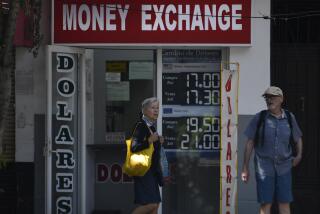Latin America Recovering, IMF Says : Economy: Financial discipline has helped the region overcome Mexico’s peso crisis.
- Share via
WASHINGTON — Latin America has overcome the worst of the Mexican peso crisis and now must let the medicine of financial discipline work what could be a surprisingly swift recovery, economists said.
According to the International Monetary Fund’s World Economic Outlook, released ahead of next week’s IMF-World Bank annual meeting, economic growth for the region will drop to 1.8% this year from 4.67% in 1994.
While not all countries were hit hard by December’s surprise devaluation of the Mexican peso, the economic slump in Mexico and Argentina was large enough to drag down Latin America’s performance.
The IMF expects Mexico’s economy to shrink 5% and Argentina’s to inch up 0.5% this year. In 1994, their economies grew at 3.5% and 7.4% rates, respectively.
However, economists argued that reforms carried out in the late 1980s and early 1990s in the worst-afflicted countries will ensure that the peso crisis will be a brief one.
The IMF’s chief economist, Michael Mussa, and Inter-American Development Bank principal adviser Liliana Rojas-Suarez, both said that six months ago they were seriously concerned about Mexico’s spillover effect.
“It’s now clear that the worst of that crisis has been passed in Mexico,” Mussa said Wednesday. “We expect the Mexican economy will begin to show significant signs of recovery as we move into the months ahead.”
As for the spillover, he said that it proved to be limited in most developing countries, with capital flows picking up robustly after a sharp drop in the first quarter of this year.
When asked what Latin America could do to overcome this round of belt-tightening, Mussa said: “Primarily, wait.”
Rojas-Suarez said the drop in output in Latin America was a consequence of a commitment by governments to curb spending to get their budgets in order instead of overspending and stoking inflation as they did after the 1980s debt crisis.
Governments are also scrambling to make long overdue reforms in their pension and tax systems and in their banking sectors to strengthen surveillance, Rojas-Suarez said.
“For Latin America, in a way, this is a good sign because during the early 1990s we did not know if the reforms were going to pass the test of the markets,” she said.
“The markets are testing the region to see if it is committed to those policies. And what is happening now seems to be an indication that, yes, the commitment is in place.”
John Welch, chief economist for Latin America at Lehman Bros., said the free market reforms championed by countries such as Mexico and Argentina before the peso crisis raised the chances of a quick recovery.
More to Read
Sign up for Essential California
The most important California stories and recommendations in your inbox every morning.
You may occasionally receive promotional content from the Los Angeles Times.









